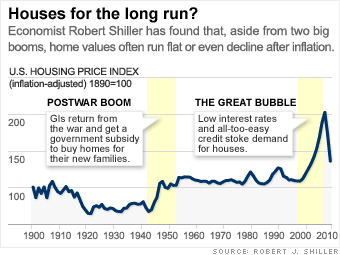The 7 new rules of financial security
In a world turned upside down, you must re-examine some basic assumptions. A good place to start: understanding the true nature of risk.

New rule: Your home won't make you rich. But it is an important savings tool.
If you live on one of the coasts, you probably guessed sometime around 2005 that home prices couldn't keep rising the way they were. But the severity of the crash was still a shock: You heard a lot about how the market would have to "cool off" or "get back to normal" - the implication being that slow but steady appreciation was the future.
But the long-run data always told a different story. Yale University economist Robert Shiller looked closely in 2005 at the history of home prices since 1890, using a database he constructed. What he found was surprising. Except for two spectacular booms - the first after World War II and the second starting in 1998 - real estate appreciation has been unimpressive after figuring in inflation. As Shiller wrote in "Irrational Exuberance," technology has allowed builders to nail up more houses faster, ensuring that supply never gets too far behind demand (and often gets ahead of it).
Even when prices are rising, gains on real estate aren't as dazzling as they look, once you account for expenses. Maintenance costs typically run at about 1% of a home's value annually, in addition to insurance and taxes. If you remodel, the most you can expect to recoup is about 80%. You have to pay steep fees when you buy (up to 3% in closing costs) and sell (up to 6% for realtor fees).
What to do: This doesn't mean you have to rent, just that you should have modest expectations for your house as a wealth builder. There are still financial pluses. First, owning a house gives you a hedge against rising values in your own community so that you don't risk being priced out as rents go up. (Ask a New Yorker about that.) Second, a traditional 30-year mortgage acts as what economists call a "commitment device," or a tool that forces you to save. Instead of writing a check to a landlord, you gradually pay off principal. At the end, you own a house. Aside from your 401(k), no other asset enforces such discipline.
NEXT: Rule No. 6: Diversification
Last updated April 13 2009: 6:02 PM ET

